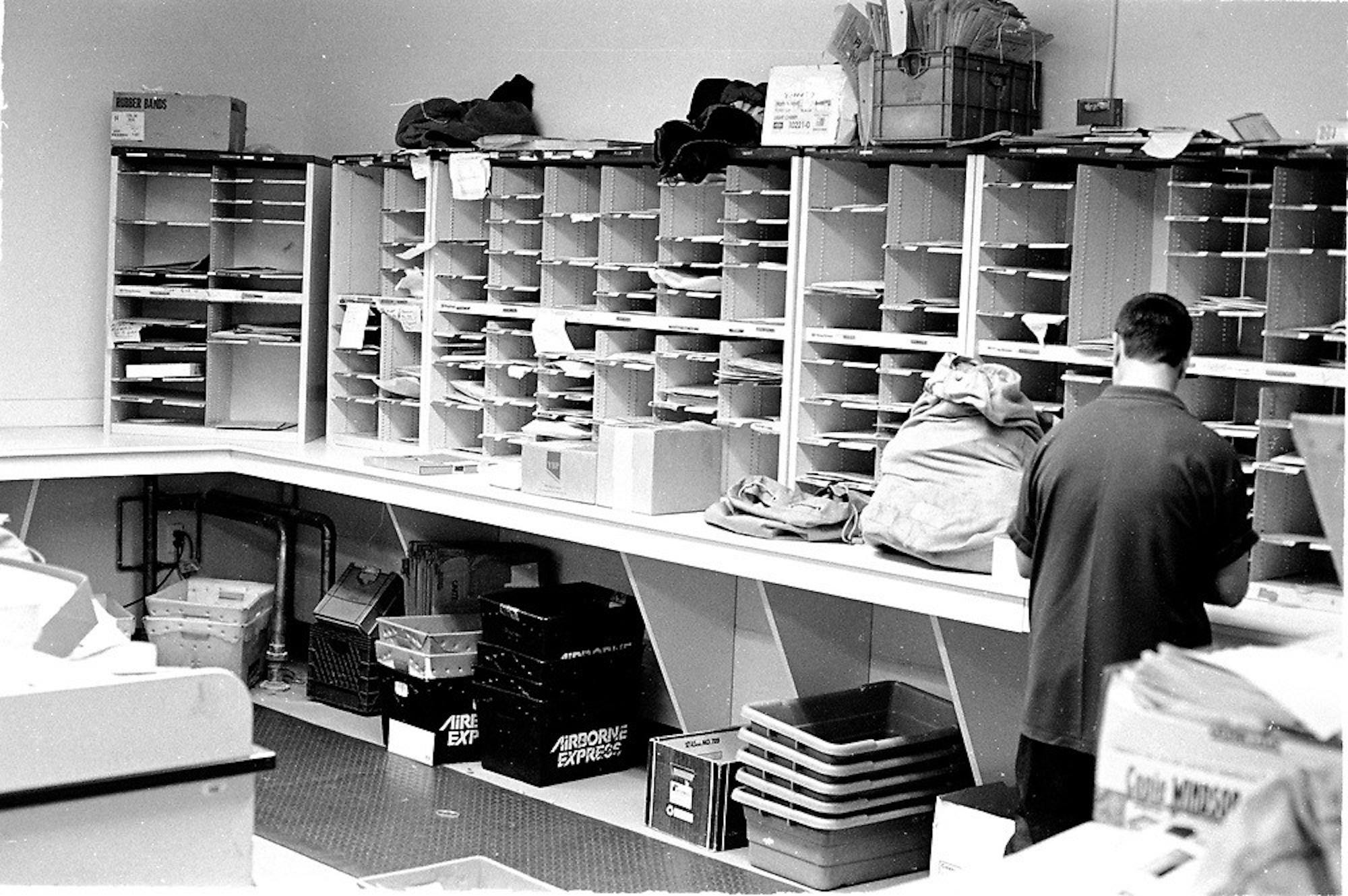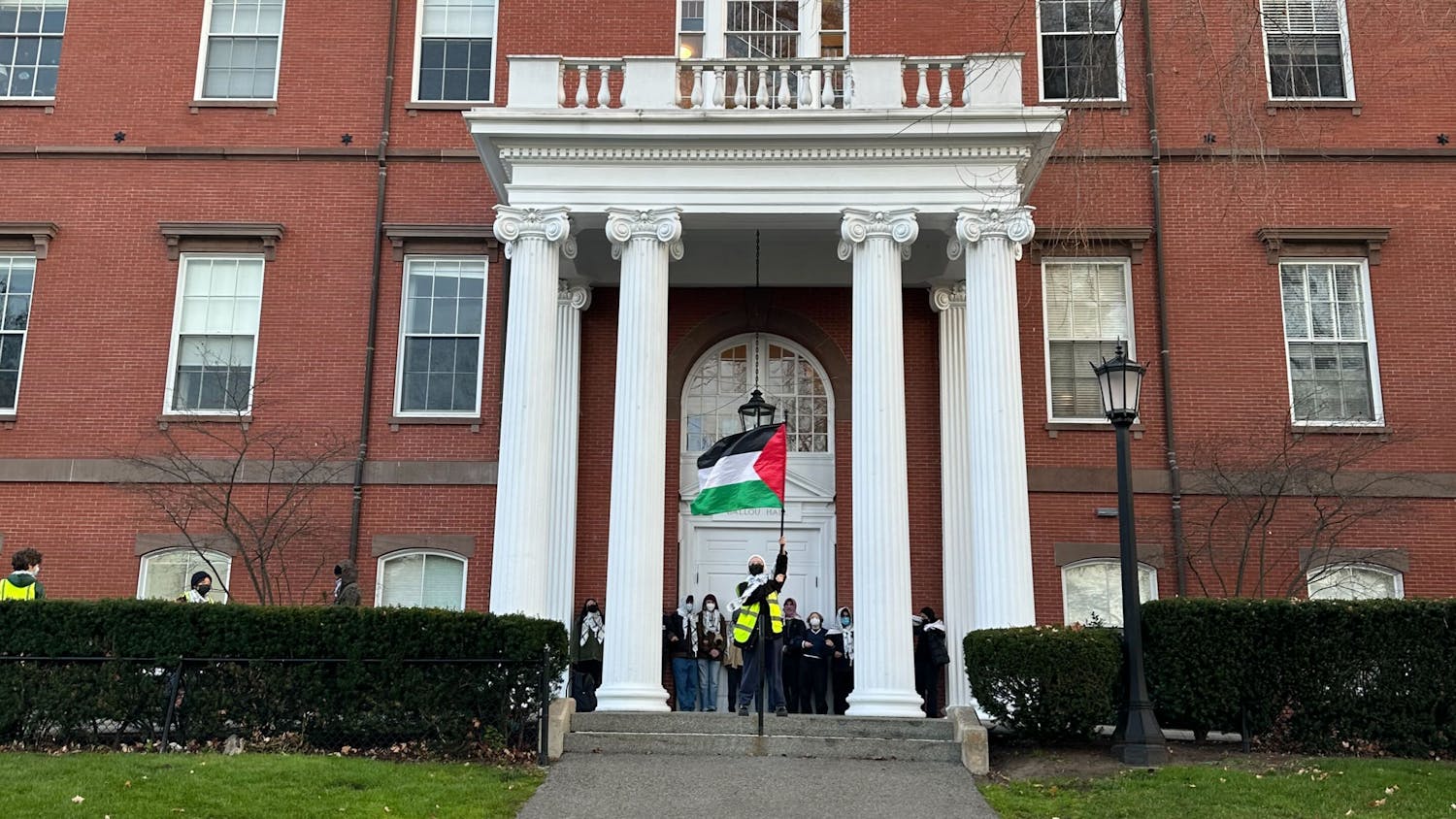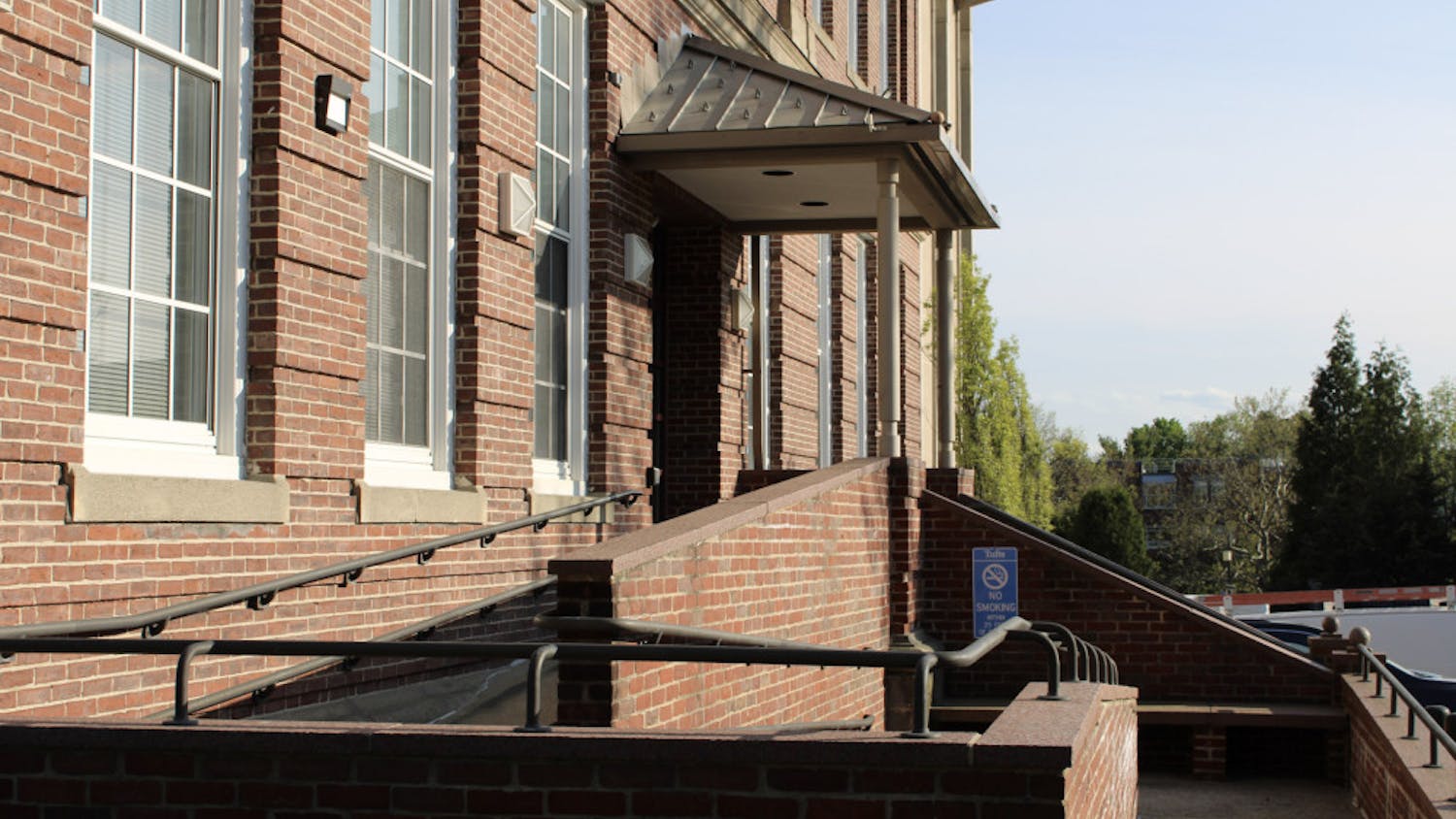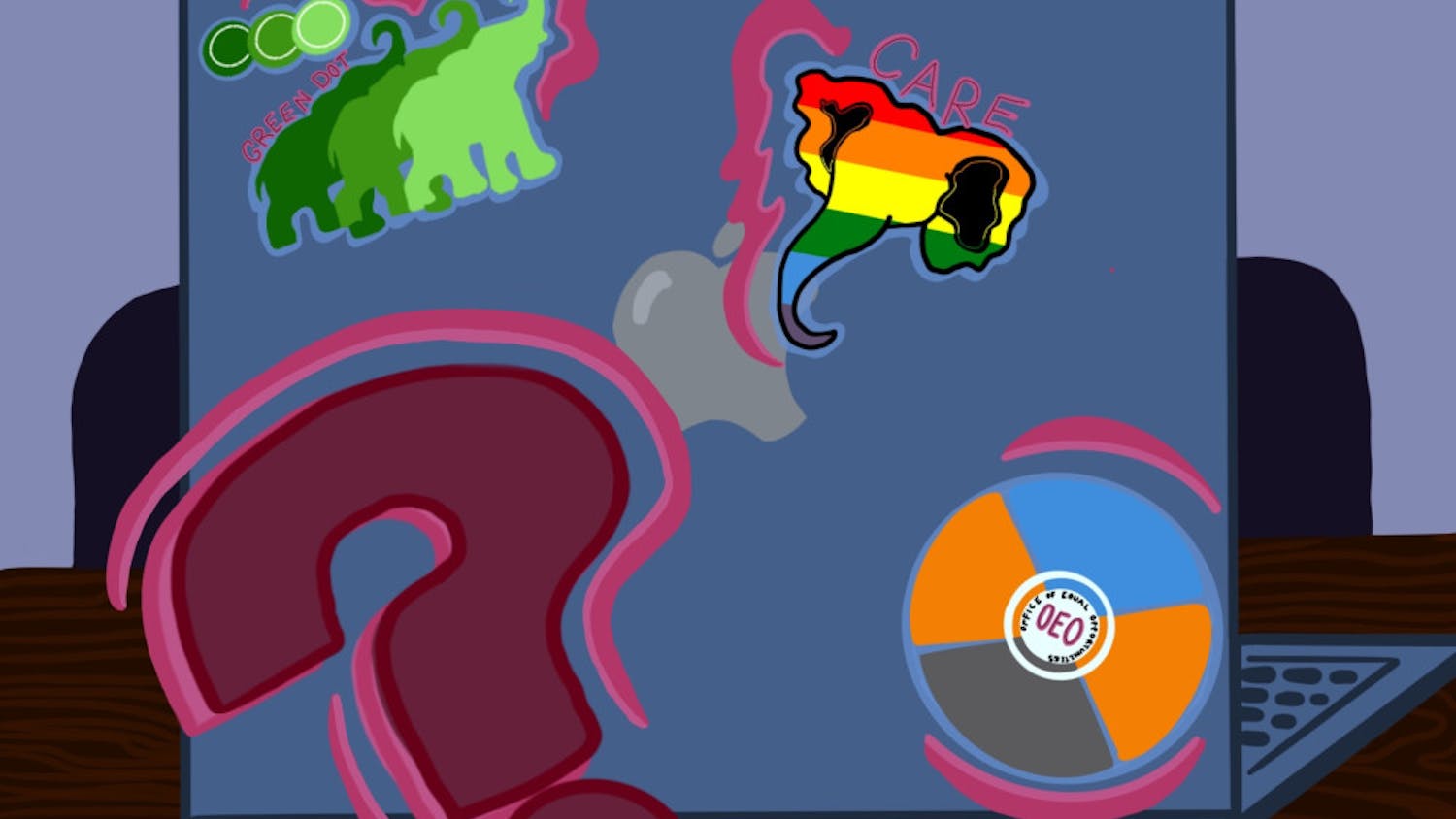When rising junior Olivia Smith wanted a job in the Tufts University Mail Services Department, she was able to start working on the mailroom floor just one day after walking in to ask about employment opportunities.
“I strolled in, and there's actually no process to get hired,” Smith said. “I just talked to Sheila, who was the current manager at the time. She was like, ‘Oh yeah, you can start tomorrow morning.’ She didn't ask me a single question.”
At Mail Services, Smith would learn that student employees do not receive weekly schedules. Instead, each employee came in to work whenever was most convenient for them on a week-to-week basis, a practice students said often elongated wait times to pick up packages and increased stress in the mailroom. Such were the conditions under former manager Sheila Chisholm, a Tufts University employee of 38 years whose unannounced departure in October formed one of many recent management upheavals the mailroom faced.
Seated at the base of first-year dormitory Hill Hall, the Medford location of the Mail Services Department and its inner workings typically operate away from public scrutiny. Yet accounts from employees, past and present, reveal a history of management upheavals that have left many of the facility’s four full-time and fifteen part-time workers reeling.
In the span of six months, Mail Services has seen the abrupt departure of longtime Support & Administrative Services Manager Sheila Chisholm, followed by the hiring and subsequent exit of Adam Lavertue, a former Groton Post Office postmaster convicted of embezzling funds from the U.S. Postal Service.
All the while, Mail Services student employees have gone weeks without pay, employees have suffered under allegedly racist management practices and the department’s full-time workers report troubling discrepancies in pay rates even after union negotiations.
Lack of scheduling, management practices compound stress
Most current student employees at Mail Services were hired by Chisholm, a longtime Tufts University employee. Employees described working for Chisholm as unpredictable and stressful.
Rising junior Anya Tisdale, who began working at Mail Services in mid-September 2019, said that Chisholm’s management style hindered productivity in the mailroom.
“Everyone knew it wasn't efficient, the way it was working. There would be a line out the door, and she would be like, I need you to readdress stuff, or I need you to do a quality check and make sure everything's in alphabetical order,” Tisdale said.
Tisdale felt acutely aware of the long lines of students that would form around the time of Black Friday, when the office had to process anywhere from four hundred to six hundred packages.
“You're scanning stuff in, you're scanning stuff out. You have to make sure things are in order, you have to readdress stuff. You have to look for packages, like if things are not in the system, where can I find them? It's a lot of hard work that I think a lot of people don't realize until you actually work there,” she said.
The Daily received no response to repeated requests for comment from Chisholm over the course of multiple weeks.
Unpaid student labor
Student workers at Tufts are due to receive pay through direct deposit on a weekly basis. Tisdale said that at times she went two to three weeks without getting paid because Chisholm forgot to enter her hours, and when Chisholm left, she didn’t receive pay for another two weeks.
Mail operator and driver Larry Singer explained that student employees logged hours either by swiping their student IDs into the system at Mail Services or by emailing their hours to Chisholm on a weekly basis. Those who emailed their hours to Chisholm depended on her to send their hours to the Facilities Services department, which she often forgot to do. On numerous occasions, Singer stepped in to ensure that the students received pay.
“These kids wanted to get paid. They didn't know where to go. So I helped them along ... I’m the in-house guy, so that’s not in my job description,” Singer said.
Director of Facilities Operations and Maintenance Jeff McKay and Senior Facilities Director Cory Pouliot denied having heard that students were not receiving pay for multiple weeks on end.
Students said Singer often stepped in as a de facto advocate or manager when Chisholm was not around or providing unclear directions, along with other more senior employees. At times, he took on the role of mediating conflict between Chisholm and student workers.
“She did have a problem with some students. She treated them differently than she treated other students,” Singer said. “I tried to buffer it a little bit, with her. To the point where [there was] one student she wouldn't even talk to. I had to talk to [the student] myself. There were issues. Students felt very uncomfortable.”
Discriminatory treatment
Each Mail Services employee interviewed by the Daily reported witnessing Chisholm’s discrimination of employees of color. After getting hired to work at Mail Services, Tisdale said that her first conversation with Chisholm caught her off guard for what she felt was unconcealed racism.
For example, Tisdale stated that when she told Chisholm she was from Boston’s West End, Chisholm said she was surprised because the area is expensive.
“I was sitting over there like what do you mean by that? What do you mean? I was like, are you trying to imply that I'm poor or on the lower-class end?” Tisdale said.
While surprised by this initial conversation with Chisholm, Tisdale said it became increasingly clear that the manager was polite to some students and not to others.
“She would be friendlier with students that were white, and then when it came to the black students and students of color, she would be walking on eggshells ... There were times when she would tell some of the white student workers to tell black student workers what to do,” Tisdale said.
She recalled incidents where employees of color were singled out or disproportionately punished for minor infractions, including when a black full-time worker was harassed by Chisholm for wearing a hood in the workplace despite the lack of an official dress code.
“He told me that he was working on his computer right under the vent so he put his hood on because it was cold,” Tisdale said. “And she asked him to take the hood off, and he was like, ‘okay I'll take it off,’ then [he] put it back on because it's cold. She kept asking him to take the hood off, then ... said, ‘oh doesn't he look like a thug when he wears his hood?’”
Morgan Kleinberg, a graduating senior who began working at Mail Services in February 2017, said that she felt this incident was an instance of blatant racism.
As a white student, she said that Chisholm often invited her into her office to perform more complex tasks or even to take charge of other student workers, which Kleinberg described as Chisholm asking her to “do [Chisholm’s] job managing some students.”
At one point, Chisholm began complaining to her about the performance of Kleinberg’s coworkers, behavior that made Kleinberg feel uncomfortable and unsure of what to say.
“I felt very trapped. I felt like I was in a very precarious situation,” Kleinberg said. “I did not want to say the wrong thing to her, and I certainly was not going to trash-talk anyone who worked there ... so it put me in a very weird position that, reflecting on it now, I should not have been put in, especially by any senior-level management.”
Lead Mail Operator Serge Lebrun, one of four current full-time employees at the Medford office, agreed that he saw differences in how Chisholm treated employees.
“She treats people — immigrants — she treats differently than other Americans. That's something we all witnessed,” he said.
Lebrun described an incident where he momentarily forgot to close the back door of a van he was driving away from the mailroom loading dock. Still in the parking lot, Lebrun realized the van door was ajar and got out to close it. He noticed Chisholm outside watching him.
“At first she just told me, be careful. In the morning she called me into her office and said, I sent you an email, but I know you don't look at your email easily, so therefore I printed you out a copy ... She gave me a written warning. She threatened me that my job could be terminated in the letter — because of the door I left open,” Lebrun said.
After presenting Lebrun with a written warning, which he later submitted to the Office of Equal Opportunity, Chisholm brought him to discuss the incident with McKay. Lebrun described feeling as though the meeting was a setup to get him fired.
“I was very calm. She expected me to blow up, say I could not deal with that guy, then kick [me] out. So I was very calm. Anyway, after I finish, [McKay] says — it's ok you're all set,” Lebrun said.
Lebrun stated that Chisholm, the day before she left her job without explanation, called him into her office with another letter which included the mail truck policy. The next day, Friday, Oct. 25, she left and wasn’t heard from again.
Lebrun expressed incredulity that after decades of employment at Tufts, it appeared that Chisholm wanted to fire him over the door.
Jackson Francois, a former Mail Services employee who has since transferred to Tufts’ facilities’ grounds department, said that he decided to transfer out of Mail Services due to Chisholm’s management practices despite otherwise loving the job.
“I thought the job was amazing ... I love talking to people, so I got to meet the students — I actually built long-standing relationships with a lot of the students that came through there. But she truly just would make the job miserable,” Francois said.
Under Chisholm, Francois and other employees dreaded coming into work at times.
“You ask any of those other guys, we would wake up in the morning and feel like, ‘do I really have to go to work today?’” Francois said.
He expressed a general reluctance to call anyone racist, yet described years of wondering why himself and two other immigrant employees were treated differently by Chisholm.
“If a mistake was made between the three of us, there was a huge meeting ... And we were made to feel inferior. She made it a point to belittle us,” Francois said. “It's just those things, you just wonder — obviously there's something about the three of us.”
Civil Rights Act responsibility
Newman, who works in the labor and employment law department of Atlanta-based law firm Seyfarth, said employers receiving complaints about discrimination should also provide resources such as anti-harassment training.
“If there was a claim that certain employees and certain other employees engaged in some acts that would constitute racial discrimination or racial harassment, then the employer would have to go ahead [and perform] its duty to provide a harassment-free workplace,” he said.
Regarding complaints of discrimination by Chisholm, McKay and Pouliot told the Daily in an email that they were not able to comment on the behavior of individual employees. They did, however, specify that managers did receive anti-harassment training.
“Under University policy, discrimination or harassment complaints are directed to [the] Office of Equal Opportunity for review,” Pouliot wrote. “Facilities Operations provides extensive training in coordination with the Office of Equal Opportunity and outside consultants for our managers and staff.”
Shipping-receiving rates
Full-time employees Singer and Lebrun stated that those working full-time at the Medford office of Tufts University Mail Services experience discrimination in pay rates. Despite the high capacity of the Medford location, which processes over 70,000 packages per year, Medford employees are not paid at the higher “shipping/receiving” rate of other employees at the Grafton, Boston and Fenway campus Mail Services offices.
“It's unfair to us. We do more work, most of the work, and the other guys do less ... We cover all four campuses. We do shipping, receiving, all types. But those guys don't receive packages, don't ship things out, but they get shipping rate. I just don't understand why,” Lebrun said.
Former Mail Services employee Eduardo “Junior” de la Rocha stated that upon joining Mail Services, he was told that he would be performing what he saw as the job function of a shipper/receiver.
“When I started, [Chisholm] gave to me a manual [with] what we're doing over there — and in the manual she said we're doing shipping and receiving. But they never pay us shipping and receiving,” he said.
According to the most recent Tufts University and Service Employees’ International Union (SEIU) contract, shipper/receivers are paid an hourly rate of nearly 12% more than mailroom operator/driver leads, and up to 19.7% more than mailroom operator/drivers.
In 2016, Mail Services employees filed a grievance with the union advocating to be paid shipping/receiving rates. The negotiations were settled with promises of a “blended rate,” an incremental pay raise still not matching that of shipper/receivers.
“They tried to pull the wool over our eyes by giving us something that had nothing to do with what we were asking for, and then they tried to tell us that we won,” Francois said.
McKay and Pouliot told the Daily in an email that the SEIU and the university hold responsibility for negotiating such issues, rather than Tufts Facilities Services. They indicated no awareness of the issues raised by Lebrun, Singer and Francois.
Lebrun stated that Mail Services used to keep track of all packages shipped and received; however, Chisholm allegedly asked employees to destroy evidence of this practice so that it was not clear that the office shipped packages.
“When she was there, she asked one of the employees to dump all of the recording books. The UPS books we use to ship things out,” Lebrun said. “Because no one could see a record of shipping. But I kept one myself.”
Francois echoed Lebrun’s claim, stating that he remembered being told to get rid of record books once Mail Services had transitioned into keeping records of shipping online.
“Before we did everything in a book, and then she found a way to get the whole process done online,” Francois said. “Once we did that, towards the end ... she asked us to throw away all the books. She didn't give us a reason, she just said ‘hey can you guys get rid of these.’”
Lebrun kept a copy of a book containing dates and times.
Lebrun and Singer both expressed a feeling of being shunted to the side by administration and of experiencing difficulties negotiating pay with the university through their union. Lebrun stressed that he is disappointed to receive a lesser pay rate after decades of loyalty to Tufts.
“We feel that we have been taken for granted, and also made us feel there is a sense of discrimination. Me, especially who has been working in the mailroom in Medford for over 20 years … All of us in the Medford campus are angry against such [an] act,” Lebrun said in a written statement.
Inconsistent management
On the October morning Chisholm left Mail Services for good, she gave no indication that day would be her last on Tufts campus after 38 years of service.
“One day on a Friday afternoon, she just said ‘I'm going to lunch, I'll be back,’ and we never saw her again,” Singer said of her departure.
Tisdale corroborated Singer’s statement, saying she had no idea Chisholm meant she did not plan to return.
“It was like she did all the time,” Tisdale said. “So no one knew if there was any kind of underlying implication that she wouldn't be coming back. It just sounded very normal, to like what she would do. It wasn't anything that was out of the ordinary.”
Employees did not receive an official explanation regarding Chisholm’s sudden exit, nor have they heard from her since. McKay and Pouliot declined to comment on the conditions of her departure.
After Chisholm left Mail Services, Kleinberg said that it became noticeably easier to perform the tasks expected of her at work each day.
“It was hard working at Mail Services,” she said. “Morale was really low when she was around. It just wasn't a fun place to work until she left. Once she left, the job became a lot easier.”
Smith also noticed a clear difference in the work environment after Chisholm’s departure, stating that mailroom efficiency increased despite lacking an official manager for the duration of November and December 2019.
“Actually, when she left, I would say the lines started going down, it actually got more organized, we were doing our own thing, which we liked. And then [McKay], the actual boss, was like ‘oh you're not going to get a new manager, you guys are fine on your own,’” Smith said. “Then after break we had a new manager. That's Adam.”
On Jan. 6, Chisholm was succeeded by Adam Lavertue, a former Groton Post Office Postmaster who recently pleaded guilty to embezzling $7,000 from the United States Postal Service after first being charged with stealing government funds on Sept. 6, 2019. Tisdale noted that this information can be quickly found on Google.
“The thing that is baffling, is that this is the first thing that comes up when you Google this [man’s] name, but Tufts hired him ... There's no way that you don't do a background check,” she said.
When asked about the hiring of Lavertue, McKay and Pouliot told the Daily in an email that they would not discuss individual employees due to privacy considerations. However, they noted that the university does not take responsibility for background checks when seeking to fill short-term positions.
“Frequently, the University contracts services through an outside agency to provide temporary employment for short-term assignments and for open positions while we actively look to permanently fill certain positions,” Pouliot wrote. “In such situations, the outside agency performs all University required pre-placement verifications, prior to individuals [being] assigned.”
Tisdale remembered Lavertue being hired in early January then dismissed without ceremony by the end of the month. Mail Services employees did not receive an official statement regarding Lavertue’s departure, yet observed what they deemed as clear signs that he would not be returning.
“They changed the locks on the mail services door a few days after this guy left. So they know. They're aware of the fact that this guy committed fraud,” Tisdale said.
In January, Smith recalled coming to work to find the full-time staff unsure of Lavertue’s location and unable to contact him over the phone.
Notably, during his short stint at Mail Services, Lavertue helped reorganize the mailroom so employees did not have to store packages in a cramped and unsafe back room as they had under Chisholm, giving some students a sense of optimism that the work environment would improve.
“The ‘WXYZ’ packages used to be kept in this ... back stairwell. It was kind of dangerous because it had a very low pipe that I barely cleared — I’m like 5’2,” Kleinberg said. “So the guys were always hitting their heads, everyone’s hitting their heads, very dangerous but [Chisholm] just kept packages back there because it was convenient.”
Before his departure, Lavertue worked with student employees to arrange packages in a different location, mitigating the inconvenience of using the “back stairwell.” Kleinberg said she had felt happy to have a manager working to improve their space.
A temporary manager, Residential Facilities Coordinator Jennifer Bevins, has subsequently been appointed in the interim. Tisdale and Kleinberg both expressed that they have seen a marked improvement in atmosphere and organization while working for Bevins.
“Jen’s been really great and understanding of all the turmoil in the office,” Kleinberg wrote in an electronic message to the Daily. “She’s been supportive to the students, even though I imagine it’s not part of her normal job responsibilities to take on this work.”
Bevins did not respond to multiple requests for comment.
Tisdale stressed that any negative experiences she has had working at Mail Services are a product of management, rather than the atmosphere created by other employees.
“Everyone that works that is not a higher-up has been absolutely wonderful,” Tisdale said. “I don't have any complaints about any other person on the staff that works there or any of the student workers. It's just, within the time that I've worked there, so a little over half a semester, we've been through two managers and they were both awful.”
Kleinberg said she hopes Tufts students picking up packages from Mail Services can empathize with student employees by recognizing that long wait times or other perceived issues are often not the fault of student workers themselves.
“A lot of people complain about it, we get a lot of complaints from parents and stuff, but like we're really doing our best ... We appreciate all the students who appreciate us dealing with Sheila,” Kleinberg said. “So anyone who's nice to us, that comes across.”
Austin Clementi contributed reporting to this article.
Editor's note: This article has been updated to better reflect that Stuart Newman did not review or comment on the events at Mail Services






